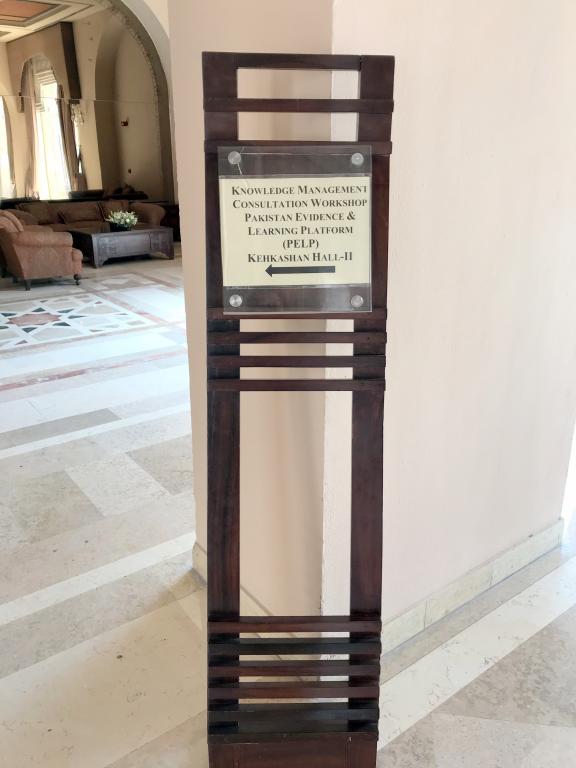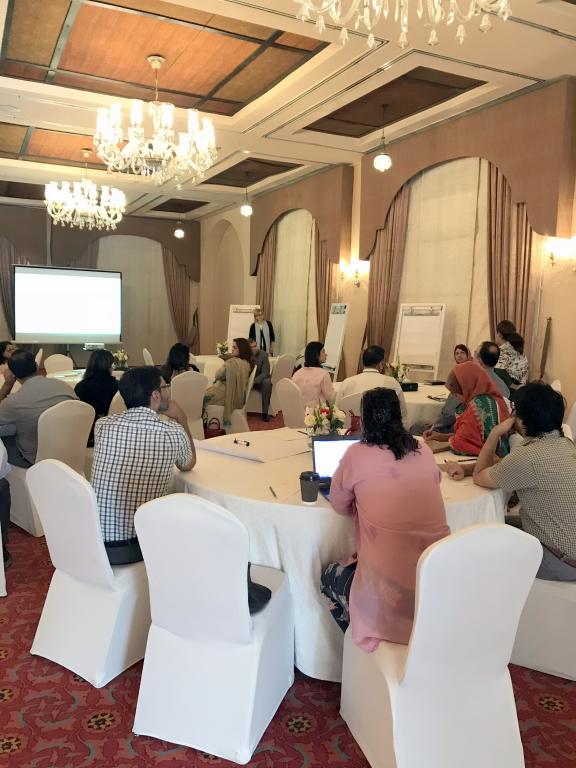PELP Organizes a Stakeholder Consultation on Knowledge Management in the Humanitarian Sector
 29 May 2018, Islamabad, Pakistan – The Pakistan Evidence and Learning Platform (PELP), funded by the UK Department for International Development (DFID) and implemented by UNITAR, organised a half-day Stakeholder Consultation on Knowledge Management in the Humanitarian Sector in Islamabad, Pakistan. This is the first in series of engagements with stakeholders to share ideas, experiences and expertise in both the knowledge management and humanitarian assistance domains. Around 27 participants took part, representing a wide cross-section of the humanitarian landscape of Pakistan, including the National Disaster Management Authority (NDMA), donors, international and national non-governmental organisations (I/NGOs) and the National Humanitarian Network (NHN), academia, and civil society. Attendance also comprised of UN agencies engaged in local humanitarian work, including the Office for the Coordination of Humanitarian Affairs (OCHA), the Food and Agriculture Organization (FAO), the UN Children’s Fund (UNICEF), and the World Food Programme (WFP).
29 May 2018, Islamabad, Pakistan – The Pakistan Evidence and Learning Platform (PELP), funded by the UK Department for International Development (DFID) and implemented by UNITAR, organised a half-day Stakeholder Consultation on Knowledge Management in the Humanitarian Sector in Islamabad, Pakistan. This is the first in series of engagements with stakeholders to share ideas, experiences and expertise in both the knowledge management and humanitarian assistance domains. Around 27 participants took part, representing a wide cross-section of the humanitarian landscape of Pakistan, including the National Disaster Management Authority (NDMA), donors, international and national non-governmental organisations (I/NGOs) and the National Humanitarian Network (NHN), academia, and civil society. Attendance also comprised of UN agencies engaged in local humanitarian work, including the Office for the Coordination of Humanitarian Affairs (OCHA), the Food and Agriculture Organization (FAO), the UN Children’s Fund (UNICEF), and the World Food Programme (WFP).
Given that the PELP is presently establishing a sustainable, digital Knowledge Hub that will strengthen knowledge management in the humanitarian sector, the Consultation was mainly designed to engage and solicit inputs of representatives from the humanitarian community and advocates of knowledge management. Participants discussed the future role and design of the PELP Knowledge Hub, while simultaneously took stock of knowledge management and latest trends and challenges in the humanitarian sector. The Consultation employed a world café format in which participants were divided into three groups to discuss, in turn, thematic coverage of the proposed hub, preferred knowledge management approaches and formats, and the institutional architecture of the Knowledge Hub. The institutional architecture is particularly important because the Knowledge Hub eventually will be transferred to a suitable host institution for sustainability. Given three rotations within the world café, all participants were able to respond to each of the topics, in turn, building on the discussions from previous rotations.
 The Stakeholder Consultation was an essential event for PELP because the participants were able to share their personal and organisational reactions to and expectations of the project. Moreover, they have also shared thoughts on the challenges of managing and sustaining the Knowledge Hub, along with concrete recommendations on developing it. Participants were found to be extremely forthcoming in their feedback in the breakout groups. The discussions reiterated the importance and need for a consolidated, comprehensive, and well-managed knowledge hub for the humanitarian sector to showcase some of the good practices and learning from previous interventions. Most humanitarian interventions are planned and implemented by organisations reacting to immediate needs and challenges rather than responding in a more structured, effective, efficient and sustainable manner based on best practices, innovations and learnings from the past. The Knowledge Hub is expected to facilitate this transformational approach. Also, the participants considered that there is a need to establish a standard and accessible repository of historical data and information that caters to the broader humanitarian community and that is not tied up to a specific project or a particular organisation.
The Stakeholder Consultation was an essential event for PELP because the participants were able to share their personal and organisational reactions to and expectations of the project. Moreover, they have also shared thoughts on the challenges of managing and sustaining the Knowledge Hub, along with concrete recommendations on developing it. Participants were found to be extremely forthcoming in their feedback in the breakout groups. The discussions reiterated the importance and need for a consolidated, comprehensive, and well-managed knowledge hub for the humanitarian sector to showcase some of the good practices and learning from previous interventions. Most humanitarian interventions are planned and implemented by organisations reacting to immediate needs and challenges rather than responding in a more structured, effective, efficient and sustainable manner based on best practices, innovations and learnings from the past. The Knowledge Hub is expected to facilitate this transformational approach. Also, the participants considered that there is a need to establish a standard and accessible repository of historical data and information that caters to the broader humanitarian community and that is not tied up to a specific project or a particular organisation.
Moving forward, PELP intends to continue with stakeholder consultations throughout 2018 going up till mid-2019, although with a more provincial and thematic focus.
About the PELP
The Pakistan Evidence and Learning Platform (PELP) is funded with UK Aid from the UK government. The PELP strengthens knowledge management in the humanitarian sector thereby ensuring a continuously improving humanitarian response. The PELP seeks to increase the accountability, transparency and effectiveness of the humanitarian system through three interconnected components: a knowledge and learning hub; third party monitoring; and an innovation grants mechanism. The PELP will initially be linked to the UN Resident Coordinator’s Office, and gradually transferred to national entities ensuring longer-term sustainability.
Photo 1: A stand to guide participants to the Stakeholder Consultation on Knowledge Management in the Humanitarian Sector.
Photo 2: Participants of the Stakeholder Consultation on Knowledge Management in the Humanitarian Sector.

